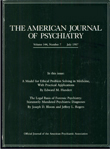Effect of dexamethasone on plasma prolactin and cortisol levels in psychiatric patients
Abstract
In addition to its ability to decrease plasma cortisol levels, dexamethasone can also significantly decrease plasma prolactin levels. In 52 psychiatric patients, including 26 patients with primary major depression or schizoaffective depression, primarily affective type, there was a significant association between nonsuppression of plasma cortisol and prolactin after administration of dexamethasone. These results suggest that the abnormal cortisol response to dexamethasone in some psychiatric patients may be due to a pituitary gland abnormality rather than to a limbic system abnormality. The sensitivity and specificity of the dexamethasone suppression test for endogenous depression were less than previously reported.
Access content
To read the fulltext, please use one of the options below to sign in or purchase access.- Personal login
- Institutional Login
- Sign in via OpenAthens
- Register for access
-
Please login/register if you wish to pair your device and check access availability.
Not a subscriber?
PsychiatryOnline subscription options offer access to the DSM-5 library, books, journals, CME, and patient resources. This all-in-one virtual library provides psychiatrists and mental health professionals with key resources for diagnosis, treatment, research, and professional development.
Need more help? PsychiatryOnline Customer Service may be reached by emailing [email protected] or by calling 800-368-5777 (in the U.S.) or 703-907-7322 (outside the U.S.).



